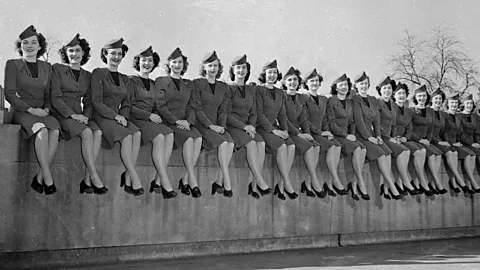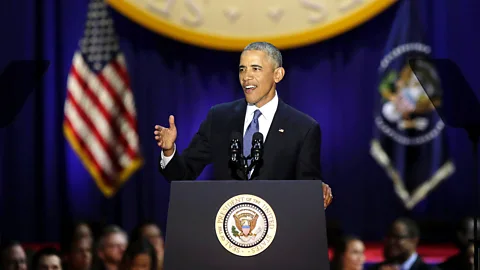The hidden sexism in workplace language
 Alamy
AlamyWhile we may think we’ve come a long way, sexism remains in the corners of the words and phrases we use at work, says Mark Peters.
Neanderthalic behaviour such as calling a woman “honey” or “baby” is as out of fashion as cave paintings. Particularly in the workplace, certain kinds of sexist language are simply no longer accepted.
But there’s mounting evidence, anecdotal and scientific, that gender-propelled language and attitudes are still common in many places of employment. Gendered words are thrown around constantly. In performance reviews, women tend to receive feedback that’s vague (“you had a great year” for example) or sexist, such as a disproportionate amount of comments on communication style, while men get clearer feedback about specific skills related to actual job performance. The disparity in how men and women are addressed can be even worse in emails. Even phrases as seemingly harmless as “two guys in a garage” can carry a gendered point of view, sending subliminal messages about who belongs somewhere.
 Alamy
AlamyDisentangling language and gender isn’t easy, since the two have a long-term relationship that is complicated. The two intermingle in so many ways, some obvious and some more subtle.
Lingering stereotypes
Many terms are objectively gendered, like the ones Deb Liu, a Facebook executive, started collecting at work. Some are old-fashioned, like a gentleman’s agreement, an expression that’s been around since the 1920s, but feels even older. Some are sports-related, like man-on-man defence and quarterback. Others sound like a team of 1940s superheroes: wingman, strawman, middleman, right-hand man, and poster boy. Many female terms noted by Liu are negative. No one, male or female, wants to be called a prima donna, drama queen, mean girl, Debbie Downer, or Negative Nancy, despite the appeal of alliteration.
Other terms and expressions aren’t specifically gendered, but they play into gender stereotypes that, zombie-like, just won’t die. For instance, researchers at the Clayman Institute for Gender Research have examined two ways of talking about leadership that infuse many aspects of the workplace, from job ads to performance reviews: agentic and communal.
 Getty Images
Getty ImagesCommunal language is mainly applied to women, and it invokes stereotypical female traits like being supportive, showing warmth, and helping the team. Agentic language is mainly applied to men and is more about getting the job done, taking charge, and being independent.
JoAnne Wehner, a research associate at Clayman, calls the agentic mode “the language of I” and the communal move “the language of we”. Even though many men and women don’t fit these stereotypes, these gendered frames can feel like a box around people at work, especially women. Similarly, male-centric lingo derived from sports, war, and machinery (like the insufferable cliché “drill down”) also reinforce the idea that the workplace is (or should be) a man cave with water coolers.
 Getty Images
Getty ImagesLayers and layers
Some words have onion-like layers of meaning that could make an etymologist cry. Guy is a prime example of the tricky, illogical evolution of language and how it reflects gender. The plural form guys is often used to mean men and women, though the singular form is almost always male. “Two guys in a garage” is commonly used as shorthand for a start-up, but this could suggest two men or two people, depending on your interpretation. So is guy (or guys) OK for the workplace? A safer alternative might be folks, a word often used by Barack Obama.
 Getty Images
Getty ImagesToday’s gendered language, though far from harmless, is a quantum leap from some formerly common ways of describing women. Words such as hostess, stewardess, and waitress are still around, though passé, but they have dozens of sister words that sound bonkers today. A woman who wrote a book was once called an authoress, a term first found in the 1400s. In the 1800s, a female assassin could be called an assassinatress. Similarly preposterous—but real—words include cousiness, fornicatress, greengroceress, inventress, murdermongress, pythoness, and revengeress. Language is strange.
A similar trend put lady at the front of words. The Oxford English Dictionary notes examples including lady-nurse, lady-housekeeper, and lady-cook. An insulting, sexist sentence by DH Lawrence in 1929 uses two such terms: “You only look so distinguished and superior, when really you are slightly inferior, like a shop-lady or a lady-secretary.” Imagine today referring to a lady-executive or lady-soldier: you’d have to be a gentleman-idiot.
Of course, we can look back on words like authoress, inventress or greengroceress and feel like we’ve made a lot of progress. But in the future, people may look back at poster boy and two guys in a garage and think they’ve made a lot of progress. We can always do better. Right, folks?
